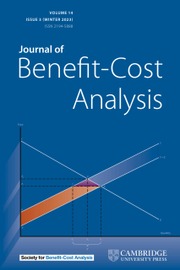Article contents
Characterizing the Amount and Speed of Discounting Procedures
Published online by Cambridge University Press: 19 January 2015
Abstract
This paper introduces the concepts of amount and speed of a discounting procedure in order to generate well-characterized families of procedures for use in social project evaluation. Exponential discounting sequesters the concepts of amount and speed into a single parameter that needs to be disaggregated in order to characterize nonconstant rate procedures. The inverse of the present value of a unit stream of benefits provides a natural measure of the amount a procedure discounts the future. We propose geometrical and time horizon based measures of how rapidly a discounting procedure acquires its ultimate present value, and we prove these to be the same. This provides an unambiguous measure of the speed of discounting, a measure whose values lie between 0 (slow) and 2 (fast). Exponential discounting has a speed of 1. A commonly proposed approach to aggregating individual discounting procedures into a social one for project evaluation averages the individual discount functions. We point to serious shortcoming with this approach and propose an alternative for which the amount and time horizon of the social procedure are the averages of the amounts and time horizons of the individual procedures. We further show that the social procedure will in general be slower than the average of the speeds of the individual procedures. For potential applications in social project evaluation we characterize three families of two-parameter discounting procedures – hyperbolic, gamma, and Weibull – in terms of their discount functions, their discount rate functions, their amounts, their speeds and their time horizons. (The appendix characterizes additional families, including the quasi-hyperbolic one.) A one parameter version of hyperbolic discounting, d(t) = (1+rt)-2, has amount r and speed 0, and this procedure is our candidate for use in social project evaluation, although additional empirical work will be needed to fully justify a one-parameter simplification of more general procedures.
Information
- Type
- Article
- Information
- Copyright
- Copyright © Society for Benefit-Cost Analysis 2011
References
- 15
- Cited by

